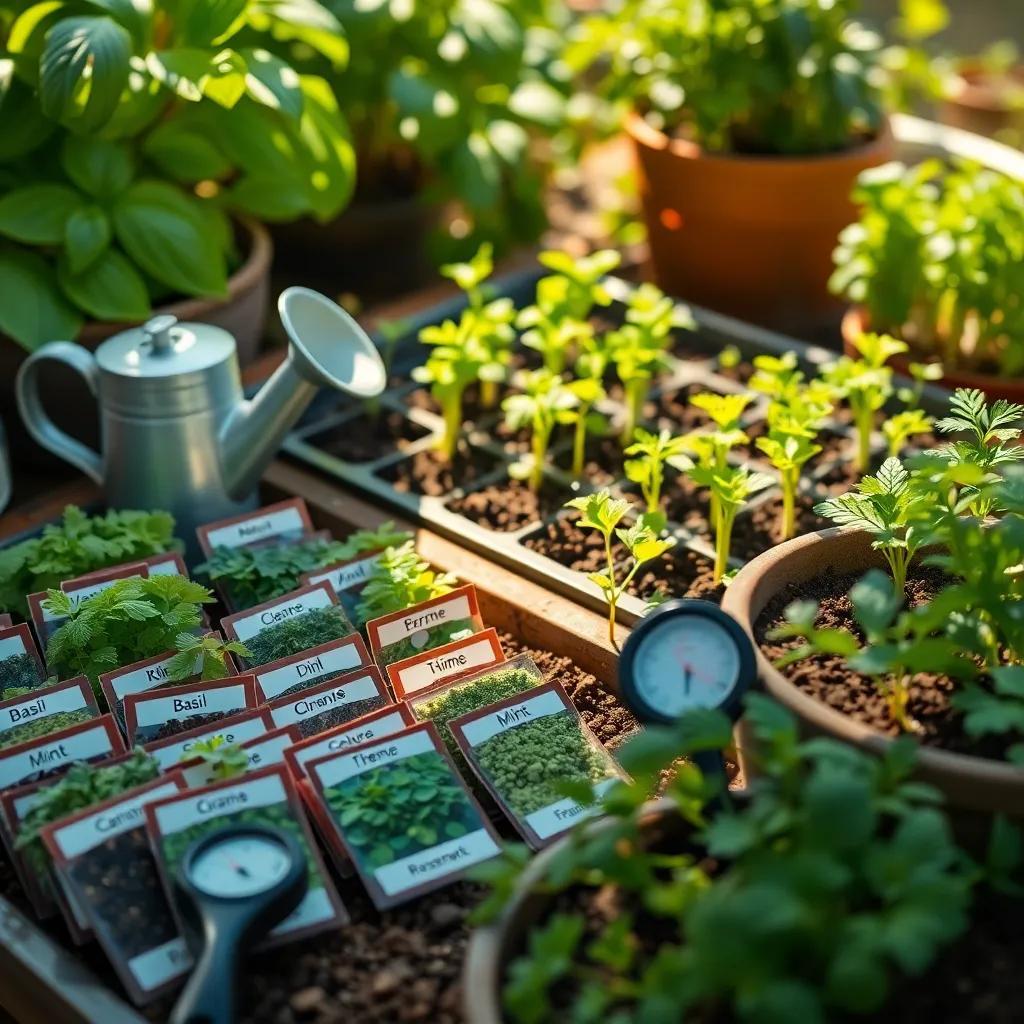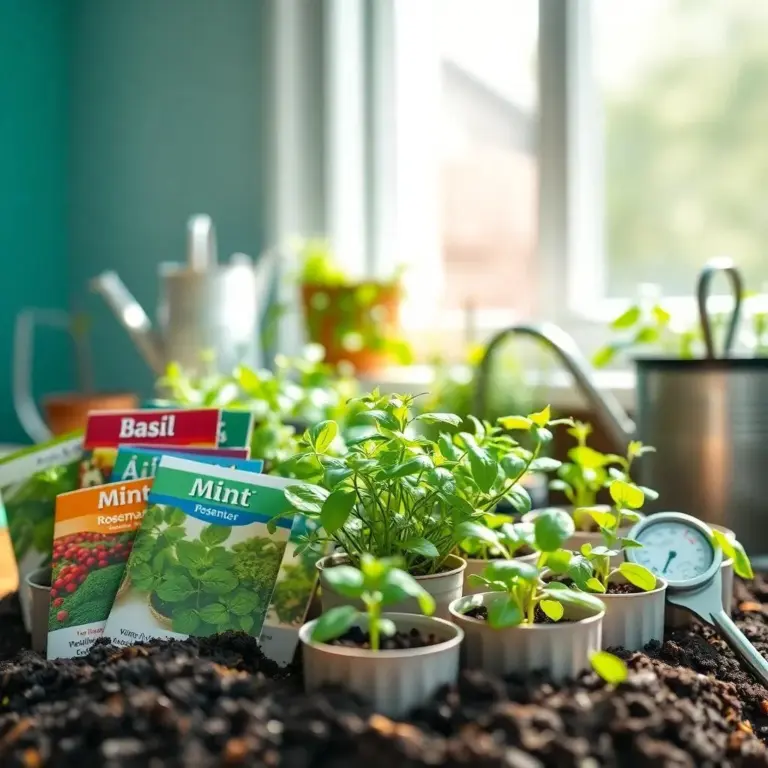Are you ready to turn your kitchen into a fragrant herb garden? Growing your own herbs is fun and so rewarding! In this article, I’ll share everything you need to know about germination times, success tips, and common mistakes to avoid. Let’s dig in and get those seeds sprouting!
Factors Influencing Herb Germination Time
Germinating herbs can feel like waiting for a surprise party to begin! You’re excited, but you’ve got to be patient. Several factors affect how quickly these little seeds sprout into beautiful herbs. Let’s explore what they are!
- Temperature: Most herbs thrive in a warm environment. They love a cozy spot between 65°F (18°C) and 75°F (24°C). A warmer temperature often means quicker germination. Think of it as creating a spa day for your seeds!
- Moisture: Just like us, seeds need the right amount of water. They don’t want to be swimming, but they also don’t want to be parched. Keep the soil moist but not soggy. It’s like giving them a refreshing drink on a hot day!
- Light: Some herbs prefer a bit of sun while others like to chill in the dark. For example, basil loves sunshine, whereas some others might not need light at all. Checking the seed packet can help you figure out what each herb prefers!
- Soil Quality: Providing good soil is like giving your seeds a comfy bed to sleep in. It should be well-draining and rich in nutrients. Poor soil can lead to sad seeds that don’t want to sprout.
- Seed Quality: Not all seeds are created equal! Fresh, high-quality seeds sprout better than old or damaged ones. When you’re at the store, pick the prettiest packages—trust me, the seeds will thank you later!
- Special Techniques: Some seeds might need special treatment. Soaking or scarifying seeds can help them germinate faster. With soaking, you just give them a little bath, and with scarifying, you gently scratch the seed coat.
By paying attention to these factors, you can create the perfect conditions for your herbs! It’s like being a seed whisperer, knowing just what they need to flourish!
Popular Herbs and Their Germination Durations
Alright, let’s get to the good stuff! Here’s a handy guide with some popular herbs and how long it takes them to germinate. Think of this as your friends’ waiting times at a restaurant—you can’t wait to see them!
| Herb | Germination Time |
|————–|————————–|
| Basil | 5-10 days |
| Mint | 5-10 days |
| Dill | 7-14 days |
| Cilantro | 7-21 days |
| Thyme | 14-21 days |
| Oregano | 10-21 days |
| Rosemary | 14-30 days |
| Parsley | 15-30 days |
- Basil: My personal favorite! It pops up quickly, usually within 5 to 10 days. It’s like a happy little surprise!
- Mint: Another speedy sprouter, mint also comes up in about 5 to 10 days. Plus, the fresh scent is divine!
- Dill: This herb takes a tad longer, sprouting in about 7 to 14 days. But don’t worry; it’s worth the wait!
- Cilantro and Thyme: These herbs like to take their time. They can germinate anywhere from 7 to 21 days for cilantro and 14 to 21 days for thyme.
- Oregano: The charming oregano needs about 10 to 21 days. But trust me, it’ll be delicious in your pasta!
- Rosemary and Parsley: These herbs are the slowpokes, sometimes taking 14 to 30 days for rosemary and 15 to 30 days for parsley. Patience is the name of the game with these guys!
By knowing the germination times for each herb, you can plan your garden and get excited for the sprouting party! Happy gardening!

Tips for Successful Herb Seed Germination
Getting your herb seeds to sprout can feel like a rollercoaster ride of excitement! So, how can you make sure they kickstart their journey without any hiccups? Here are some friendly tips I’ve gathered to help you become a germination pro:
- Choose High-Quality Seeds: This is where it all begins! Fresh, high-quality seeds are like a pizza with all the right toppings. Check for seeds that are well-packaged and free from any signs of damage.
- Read the Instructions: Each herb is unique! Pay attention to the information on the seed packets. These little bits of wisdom will guide you on temperature, moisture, and light needs.
- Pre-Soak or Scarify: If you want to speed things up, consider pre-soaking your seeds overnight before planting. For those with tough outer coats, a little scarification (gently scratching the surface) can help them break out faster!
- Create the Right Environment: Your seeds need a comfy, cozy space to grow. Keep the temperature consistent and maintain adequate humidity. A mini greenhouse effect can be created by covering the plant with a clear plastic lid or wrap.
- Use Well-Draining Soil: The right soil is essential! A mix of peat moss, perlite, and vermiculite works wonders. It keeps the soil light and airy, preventing water from sitting too long.
- Monitor Moisture Levels: Keeping your soil “just right” is key. Aim for a consistently moist texture, but avoid overwatering. A simple spray bottle can be your best friend here!
By following these tips, you’ll be on your way to a flourishing herb garden! Get ready to watch those little sprouts grow into beautiful, flavorful herbs!
Common Mistakes to Avoid When Germinating Herbs
Even the best gardeners can make mistakes, and that’s totally okay! Learning from them is part of the fun. Here’s a list of common pitfalls to avoid during your herb germination adventure:
- Overwatering: This is probably the most common mistake. It’s easy to drown your seeds, thinking they need a lot of water. Instead, keep the soil slightly moist but not soggy. A gentle misting will do the trick!
- Underwatering: On the flip side, letting seeds dry out can also be harmful. Check your soil daily! If it feels dry to the touch, it’s time for a sprinkle.
- Planting Seeds Too Deep: If you bury the seeds too deep, they may struggle to push through the soil. Always follow the recommended depth on the seed packet. Remember, they need a fighting chance!
- Ignoring Temperature Needs: Each herb has its preferred temperature. If it’s too cold or too hot, they might just sit there, sulking. Keep them in a cozy spot that matches their requirements.
- Using Poor Quality Soil: Low-quality soil can lead to poor germination rates. Invest in a good seed starting mix, which is light and nourishing!
- Not Thinning Seedlings: If your seeds germinate too close together, they’ll compete for resources. Thin out the weaker seedlings carefully to give the stronger ones room to grow.
By dodging these common mistakes, you’ll give your herbs the best shot at thriving! Happy gardening!
Frequently Asked Questions About Herb Germination
Let’s chat about some common questions I get about germinating herbs, shall we? You might find the answers you’re looking for right here!
Q: What are some common herbs that take a long time to germinate?
A: Some herbs like parsley, cilantro, and rosemary can take a bit longer, sprouting anywhere from 14 to 30 days. Patience is key with these herbs!
Q: Can I speed up the germination process for herbs?
A: Absolutely! Providing the right conditions, like consistent moisture and warmth, can help. Just remember, every herb has its own speed limit!
Q: Why do some herbs take longer to germinate than others?
A: Great question! Some seeds have tougher coats, while others need specific temperature or light conditions to wake them up. It’s like they all have their own little personalities!
Q: What can I do if my herb seeds are not germinating?
A: If your herbs aren’t sprouting, try adjusting the temperature and light conditions. A little gentle scratching on the seed coat can also help water penetrate!
Q: How long does it take for herbs to germinate on average?
A: On average, most common herbs take about 7 to 14 days to germinate. Some might be speedy, while others might delay the party!
Now that you have these answers, you’re ready to tackle your herb gardening journey with confidence! Happy planting!

